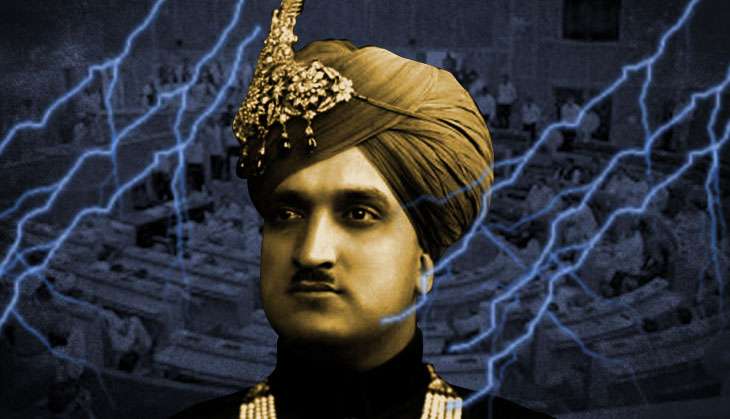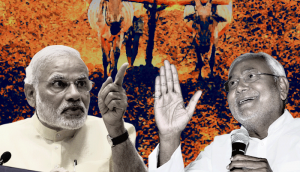
When, on 25 January, the J&K assembly passed a resolution declaring the Dogra monarch Hari Singh's birth anniversary on 23 September as a holiday, it brought into play the state's founding ideological questions and pitted parties based in Kashmir against their counterparts in Jammu.
Hari Singh is a controversial figure, viewed through divergent political prisms by the majority and minority communities. For the Muslim majority, especially in the valley, he was a tyrant whose ancestor had bought Kashmir from the British. According to the Treaty of Amritsar signed on 16 March 1946, the British sold "all the hilly or mountainous country with its dependencies situated to the eastward of the River Indus and the westward of the River Ravi" to Gulab Singh for 75 lakh Nanak Shahi rupees along with other annual tributes.
Also Read: Sense of insecurity: why a spate of proposed yatras has Kashmir on edge
Hari Singh was the fourth and the last Dogra monarch, ruling from 1925 to 1952, when he was forced to give in to a transition to democracy following a two-decade long popular struggle led by Sheikh Abdullah, coinciding with the independence of India. Abdullah, who took over as the first prime minister of an autonomous Jammu and Kashmir in 1948, was thus hailed as a hero who had rid the state of autocratic rule, identified in popular memory, more so in Kashmir, with the oppression and subjugation of the rights of the majority community.
This is why even though Karan Singh, son of Hari Singh who succeeded him as the Sadr-i-Riyasat, or president, the newly democratic J&K partly defined itself in antagonism to the despotic Dogra rule. It was now a 'Naya (new) Kashmir' as defined by the title of a political manifesto prepared by Sheikh Abdullah, outlining the transition of Kashmir from absolute monarchy to a constitutional democracy and a detailed plan for its economic development.
Kashmir's approach to Dogra rule is thus comparable to the rest of India's to the British rule. But not so in Jammu, parts of which saw in the monarchy's abolition a loss of political power to Kashmir. Indeed, it was this deep sense of political marginalisation which resulted in the growth of ultra-right Hindu religious outfits such as Praja Parishad in the province.
The Parishad spearheaded opposition to the perceived Kashmiri dominance of the state in 1949. It opposed a separate constitution and flag for Kashmir as also Article 370 of the India Constitution which grants Kashmir a special status and forbids the owning of land by non-state subjects. Parishad, one of the ideological progenitors of the BJP, was also stridently opposed to Sheikh Abdullah's National Conference, which it saw as representing only the aspirations of Kashmiri Muslims. Sheikh was even accused of "Muslimising" the state through his Kashmir-centric policies. In fact, the Parishad created communal disturbance in Jammu in the 1950s when a National Conference flag was hoisted at a local college.
The holiday on Hari Singh's birth anniversary is thus not only about the monarch's rehabilitation as a benign historical figure in his own state, it is also about mainstreaming a parallel historical narrative. It also symbolises Jammu's reassertion as an equal stakeholder in the governance of the state. Now J&K will, quite ironically, observe a holiday both on Sheikh's and Hari Singh's birth anniversaries, making the historical hero and his villain equal in the eyes of the government.
Also Read: Kashmir unrest: how RSS ideology blinds Modi govt to the reality
The resolution was moved by BJP member Ajatshatru and seconded by PDP MLC Vikramaditya, both grandsons of Hari Singh and sons of the Congress veteran leader Karan Singh.
Though education minister Naeem Akhtar urged Ajatshatru to withdraw the resolution, assuring him his proposal could be considered, it was to no avail. It was carried by voice vote in the absence of the opposition Congress and National Conference members.
When the assembly resumed its session the next day, the NC staged a walkout from the Legislative Council, alleging a conspiracy in the way the holiday was declared in their absence. NC members also demanded the withdrawal of the resolution, saying it was passed "undemocratically and in violation of the rules".
The independent legislator Engineer Rashid, who created a ruckus over the issue, also articulated the irony of the situation. "How can we praise Sheikh Sahab and Maharaja Hari Singh at the same time?" he questioned.
He also asked the BJP if it would observe Martyrs Day on 13 July, which commemorates the Kashmiris killed during the struggle against Hari Singh's rule.
The PDP, which is ruling in alliance with the BJP, played down the issue, preferring to oppose the holiday only as an unnecessary addition to the long list of government holidays in J&K. Some leaders, though, tried to give it a clever political spin. "Maharaja Hari Singh is an important historical figure," said PDP MLC Firdous Tak. "He gave us our identity, Article 370."
He is technically right. It was Hari Singh who signed the Instrument of Accession of J&K to India in 1947 after the Pakistan Army and raiders attacked the state. The accession, however, was limited to just three subjects - defence, foreign affairs and communications. The terms of the accession were later enshrined in the Article 370 of the Constitution of India.
Also Read: Kashmir is again on the edge. The spark: 'domicile status' to Pakistani refugees







![BJP's Kapil Mishra recreates Shankar Mahadevan’s ‘Breathless’ song to highlight Delhi pollution [WATCH] BJP's Kapil Mishra recreates Shankar Mahadevan’s ‘Breathless’ song to highlight Delhi pollution [WATCH]](http://images.catchnews.com/upload/2022/11/03/kapil-mishra_240884_300x172.png)

![Anupam Kher shares pictures of his toned body on 67th birthday [MUST SEE] Anupam Kher shares pictures of his toned body on 67th birthday [MUST SEE]](http://images.catchnews.com/upload/2022/03/07/Anupam_kher_231145_300x172.jpg)






